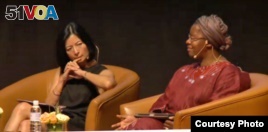May 29,2013
Leaders of some of the world’s top foundations say much more needs to be done to encourage the hopes, dreams and ambitions of young girls. The issue was discussed at the Women Deliver confer ence in the Malaysian capital, Kuala Lumpur.

MasterCard Foundation President and CEO Reeta Roy and World YWCA General Secretary Nyaradzayi Gumbonzvanda are among foundation leads at Women Deliver conference in Kuala Lumpur. (Credit: Women Deliver)
United Nations Foundation President and CEO Kathy Calvin said investing in girls has long term benefits.
“If we don’t put a girl first, if we don’t start with a girl, we may never have the opportunity to help her as a woman. If you address a girl’s issues across the board, you have a really good chance of ensuring that she will have an opportunity to live a long and healthier life – changing both her life and her family’s.”
Maria Eitel, President and CEO of the Nike Foundation, said that often there’s a small window of opportunity to intervene on behalf of girls.
“The younger girls are full of hope – I want to be a doctor…I want to be a pilot…and with enormous hope and aspiration. But at that moment of puberty – at 13, 14,15 – it shifts entirely. And what the girl entirely talks about is barriers to her ability to succeed, particularly around the areas of violence and the area of economic duress for her family,” she said.
Eitel said in many countries the young girl is “painfully aware” that when her family faces economic problems her life can change dramatically.
“She will be the first to leave school. She will be the first to not eat. They are painfully aware of this. They are very savvy and they understand that their future is linked to their family’s economic future. They also understand something very interesting – that their parents are caught in a very difficult decision-making tree. They see that violence is very predominant, and they see the risks that they face. And they understand that their parents are trying to protect them. But they see that that same protection turns into exactly what prohibits them from progress.”
World YWCA General Secretary Nyaradzayi Gumbonzvanda said that violence is a major obstacle to women and girls.
“When we have freedom of violence in our homes, in our communities, in our countries, we have opportunities to walk to the river. We have opportunities to walk to school. We have opportunities to be,” she said.
But Gumbonzvanda added that girls want and deserve much more.
“Our girls,” she said, “are asking for social and economic empowerment. Education, education, education and education.”
However, U.N. Special Advisor Dr. Nafis Sadik said when it comes to education, what girls want and what they get are often two different things.
“The fact that they can go to school is the decision of the family. And the family still in many parts of our world, especially in the rural areas and even some urban areas, preference is given to boys for the reason that they are the breadwinners.”
Sadik said that a lack of education often means a lack of life skills and awareness.
“They want to keep the girl ignorant. And, you know, there are hundreds of women, thousands of women in our societies, who get married and don’t know anything about sexuality and sex, and it comes as a great shock. They get infected with HIV and they really didn’t know that they could get infected,” she said.
MasterCard Foundation President and CEO Reeta Roy said there’s no such thing as a truly free education for girls.
“Even for primary education, which is free, the fees, which are related to uniforms, to books, to supplies, to events, become prohibitive for families to actually overcome. And those costs only increase as we move up the food chain towards secondary education and to university,” she said.
Investing in a girl’s education, Roy said, pays large dividends.
“The opportunity to invest in a young [girl’s], or an adolescent girl’s education, is nothing short of not only shifting her trajectory, but actually fundamentally creating much more inclusive societies; and creating economic growth, which is much more equitable.”
Women Deliver is a global advocacy organization. Its third conference in Kuala Lumpur follows meetings in 2007 and 2010.